I'm sure that you know my love of personally-selected teas. I freely admit huge bias in favour of cakes made by Real People, not factories.
This particular tea is a special one - but I've noticed that I think that about nearly all personally-made teas. All personal cakes are special, but some cakes are more special than others.
This particular tea is a special one - but I've noticed that I think that about nearly all personally-made teas. All personal cakes are special, but some cakes are more special than others.
It's a xiaobing, a little cake, and we can see a stamp of the name "Wang Bin" (in red) in the photograph above. This is the name of the tea-farmer with whom Nada stayed in a previous trip to Yunnan, and who pressed seven of these little cakes in his family-run business. This being one of those seven cakes accounts for my warm feelings towards it.
Nada selected the leaves from Yiwu, and tells me that they are genuine non-plantation leaves. Without such personal verification, it's very difficult to know what you're getting in your tea. I'll spare you my regular gripe about China needing "DOC"-style appellations to protect the producers in special areas.
Below, a photograph with a regular 375g bing to give you an idea of scale.
Nada selected the leaves from Yiwu, and tells me that they are genuine non-plantation leaves. Without such personal verification, it's very difficult to know what you're getting in your tea. I'll spare you my regular gripe about China needing "DOC"-style appellations to protect the producers in special areas.
Below, a photograph with a regular 375g bing to give you an idea of scale.
The compression is just right - firm, but easily separated, giving the cake a pleasing, chubby appearance. I've not yet got to freeing the neifei [inner label], but I assume it says "Nada Chayuan", as does his fine Cha Chan Yi Wei cake.
I'm spending more time with the dry leaves these days, as they seem to tell a lot about the tea. From the strength of the aroma, something of the tea's potency can be gathered. From their sweetness, savoury-ness, floral-ness, something can be gleaned as to the resulting characteristics in the cup.
I hope that one day this will come in handy when looking for my own maocha in Yunnan. Time spent wandering tea-filled mountains sounds very appealing to me.
I hope that one day this will come in handy when looking for my own maocha in Yunnan. Time spent wandering tea-filled mountains sounds very appealing to me.
Everything from furry tips to twigs and bracken exists in this eclectic mix - I'm a believer in complex maocha, throwing in a bit of everything, as this helps its complexity. 1-D maocha is a bit flat, unless you have some cunning big-factory style processing on your side to perk things up.
The aroma is fresh and sweet, and exceedingly pungent - they are like normal leaves, but "more".
The aroma is fresh and sweet, and exceedingly pungent - they are like normal leaves, but "more".
The soup comes out looking like Chablis, and has the exceptional clarity that one would hope for in an honest, clean tea. The lengxiang [cooling scent in the aroma cup] is unusually sweet, just like the dry leaves.
You can tell from the photograph that it has a little light-brown colouring to it, and this corresponds to that "brown" flavour I sometimes describe - a low savoury tone, complex and complementary to the sweetness.
"So soft", says Lei, "It is gentle, with no harshness at all, just like Nada."
You can tell from the photograph that it has a little light-brown colouring to it, and this corresponds to that "brown" flavour I sometimes describe - a low savoury tone, complex and complementary to the sweetness.
"So soft", says Lei, "It is gentle, with no harshness at all, just like Nada."
"More" is a good word to describe this little cake: more of everything. More sweetness, more potency, more complexity, more chaqi. The chaqi is a knock-out. At 10 o'clock in the morning, this tea knocks me sideways - my palms are blotchy red-coloured with warmth, and my head feels sharp and crisp.
I imagine Nada selecting the leaves after sampling through Yiwu, discussing the production with Mr. Wang, and I hope he enjoys the result as much as do Lei and I. Since last summer, I've had half-a-dozen fine sessions with this tea, and each has brought a smile to my face.
I imagine Nada selecting the leaves after sampling through Yiwu, discussing the production with Mr. Wang, and I hope he enjoys the result as much as do Lei and I. Since last summer, I've had half-a-dozen fine sessions with this tea, and each has brought a smile to my face.
(Nada Chayuan Yiwu Laoshu = Nada CHAR-YOOAN EE-WOO LAOW-SHOO)

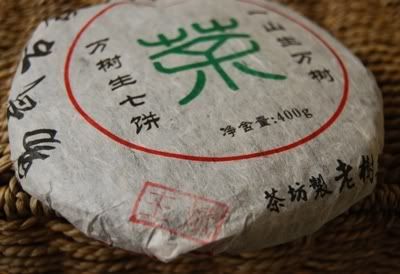
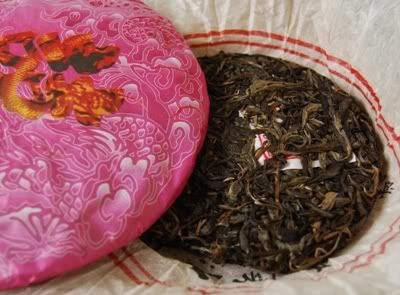
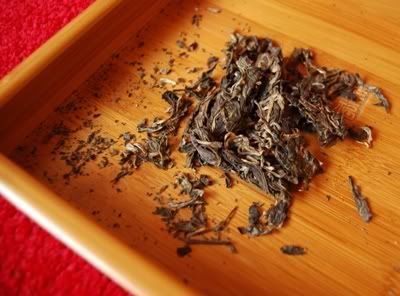
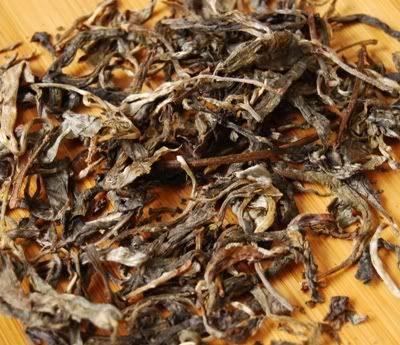
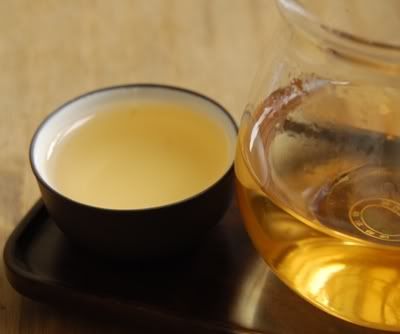
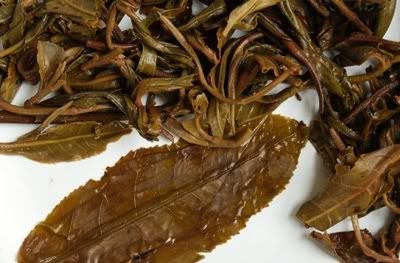
Dear Hobbes & Lei,
ReplyDeleteI'm so glad you enjoyed this bing. I haven't drunk it in a long time, will have to dig one out to taste again.
Selecting and pressing a bing oneself is a fun process and having some tea cakes to bring back memories of the occasion is one of the best souvenirs from a tea trip that I can think of. Even better than this is the joy of sharing tea with others. That's the best source of happiness from such an adventure.
Happy tea drinking,
with warmest wishes,
nada.
I'll drink to that.
ReplyDeleteGood health,
D.
Yiwu tea or Wuyi tea?
ReplyDelete